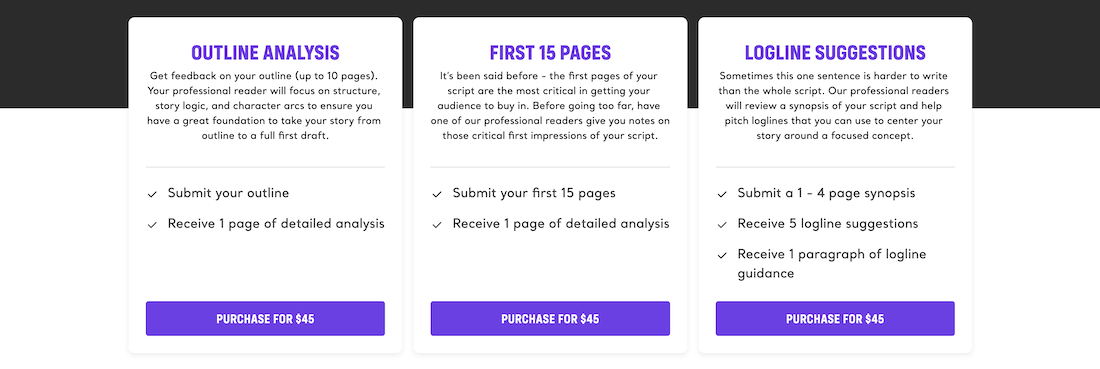Let’s face it, becoming a professional screenwriter is a difficult goal/dream to achieve. The competition is high, and the odds of making it are very low. But somebody has to make it. And the hundreds that do each year—amongst the tens of thousands that submit scripts to competitions, fellowships, production companies, networks, streamers, and managers—come from all walks of life.
It can and will happen if you’re ready to face some hard truths. And be prepared because these hard truths may be brutal to swallow at first. But they are delivered as tough love from a 20-year industry vet with many studio meetings, pro script contracts, and produced features under their belt.
This is what it takes to transition from a novice screenwriter to one ready, worthy, and able to become a professional.
3 Truths Every Screenwriter Needs to Face
1. You Need to Stop Relying on Feedback from Others
Feedback is an essential learning tool for novice screenwriters. It can come in the form of the following:
- Mentor feedback (instructors, teachers, industry connections)
- Peer feedback (writer groups, writing partners, family, friends)
- Professional feedback (scripts consultants, script coverage, competition/fellowship notes)
Getting some fresh eyes on your material is good as you start out. Novice screenwriters are naturally prone to having their heads in the clouds about their own work. You become blinded by excitement, enthusiasm, and delusions of grandeur. Every screenwriter goes through that.
Seeking out mentor, peer, and professional feedback can be very helpful in bringing you back down to earth with constructive criticism and script/story/character analysis.
But after those first few scripts, you need to stop using feedback as a crutch. You must begin to evolve your process to the point where you are self-reliable and able to look upon your own work as objectively as possible. This is perhaps the most remarkable feat a screenwriter can achieve in their screenwriting career—being able to look upon your own work and see both the strengths and flaws without having to rely on others to point them out for you.
The hard truth is that you can’t rely on anyone else when you’re on assignment or paid to do the first requested rewrite for a script you just sold. You can’t take it to a mentor, peer, industry contact, or consultant. By contract law, it’s on you.
The sooner you get to a point where you do not need or want to send your latest draft to someone else for feedback, the sooner you’ll be ready to become a professional screenwriter.
Studios, networks, streamers, and production companies aren’t hiring you and your support group of mentors, peers, and paid script consultants. They’re just hiring you. They want and need individuals who can develop, write, problem-solve, apply notes, and collaborate.
Read More: The Differences Between Script Notes and Feedback
They hire screenwriters for their individual voices. And finding those unique—or genre-specific—voices is a coveted part of their development process. They need and want the right fit for the projects they are developing.
On your end, finding your voice as a screenwriter is one of the most magical phases of the screenwriting process.
But you can’t do that when you’re constantly requesting feedback from others. Each person giving you notes and feedback injects their wants and needs for your story, and it’s their opinion that is changing your original voice. While they can certainly point out things you may not have noticed in your script, it’s your job to get to the point where you can do that for yourself.
The only way to do that is to stop sending your drafts to others and take ownership of your work.
2. You Need to Trust Yourself and Take Ownership of Your Writing
All screenwriters need to reach a point where they are confident in themselves and their work.
- You don’t know everything.
- Learning never stops.
- You can improve.
But you need to be confident that you’ve told the story that you intended to tell in the way you intended it to be told.
No script consultant, mentor, or peer can get you to that point. It’s truly up to you, and that’s what developing and having your own voice is all about.
When you’re writing on spec or finishing that first draft of a pro assignment, you decide when the draft is done. You can’t rely on others to tell you.
This changes when you submit or hand in the assignment, yes. Then it’s up to the powers that be to decide their own needs and wants for further drafts, and that’s different from seeking out the opinions of others for feedback.
But you need to learn to trust yourself and take ownership of your writing to the point where you can effectively say, “OK. I’ve done everything possible to get this where it needs to be.”
The most underrated talent in screenwriting is knowing when the screenplay is done. It’s not the first daft, the second draft, or the one your taking out to first rounds of contest.
The final draft.
The one you never touch again until it’s gone out to industry insiders and they’ve either:
- Hired you to do a rewrite (studios, networks, streamers, production companies).
- Signed you as a client and need you to make some changes before they take it out wide (managers).
You accomplish this by taking ownership and not letting those insecurities seep into your decision-making process.
Read More: 5 Ways You Can Determine If Your Script Is Done
Taking ownership is scary but necessary. When you’re a pro working under contract, it’s part of the screenwriting process.
Know that the insecurity doesn’t dissolve once you become a paid screenwriter. All professional screenwriters struggle with self-doubt, and that never goes away.
- Sometimes the assignment drafts we hand in are ones we’re sure will have little-to-no notes but end up having many.
- Others that we’re unsure of in places and expect major notes on end up having little to none.
Taking that ownership sometimes involves working until your deadline and handing in what you feel is your best work, despite lingering issues that may or may not be a problem for the powers that be.
- No script is perfect.
- No draft is foul-proof.
- No screenplay is ever really done until it’s interpreted on the screen.
Take that worry off of your shoulders and get yourself to a point where you can stop relying on others and take individual ownership of your writing. It will be the most liberating part of your screenwriting journey as you prepare for the big leagues.
3. Your Spec Scripts Likely Won’t Sell
Here is the module that most novice screenwriters aspire to:
- Write a high-concept or desirable script.
- Sell said high-concept or desirable script.
- Rinse and repeat for a successful screenwriting career.
The eye-opening hard truth is that this module is the anomaly in Hollywood. For a majority of screenwriters, this will never happen.
- In 2020, reported spec sales amounted to a number in the twenties, mostly from already-represented screenwriters.
- In 2021, there were an estimated 34. Again, most by already-represented screenwriters.
“But that was because of the pandemic,” some would retort.
That’s not to say the spec market is dead. Not by any means. It’s just a realization novice screenwriters need to know and understand. 99% of the screenplay contracts in the industry are assignments, not sales.
Read More: Why Screenwriters Should Focus on Getting an Assignment Over Selling a Script
Instead, spec scripts are used as calling cards to get you in those coveted Hollywood doors. Your scripts offer Hollywood proof of talent.
Spec scripts do sell, but you can’t linger in the clouds expecting them to go for big money. That said, you shouldn’t shift your goals of writing amazing scripts with desirable concepts and outstanding characters.
And remember, when you do start getting contracts—and hopefully, some produced credits—you can always keep those hot spec scripts in your back pocket for renewed life during meetings and after you’ve made some great Hollywood connections.
—
Don’t let these hard truths dissuade you. They are the necessary pieces of knowledge you need to flip that switch to become a screenwriter that is ready, willing, and able to become a professional screenwriter.
Check out our Preparation Notes so you start your story off on the right track!
Ken Miyamoto has worked in the film industry for nearly two decades, most notably as a studio liaison for Sony Studios and then as a script reader and story analyst for Sony Pictures.
He has many studio meetings under his belt as a produced screenwriter, meeting with the likes of Sony, Dreamworks, Universal, Disney, Warner Brothers, as well as many production and management companies. He has had a previous development deal with Lionsgate, as well as multiple writing assignments, including the produced miniseries Blackout, starring Anne Heche, Sean Patrick Flanery, Billy Zane, James Brolin, Haylie Duff, Brian Bloom, Eric La Salle, and Bruce Boxleitner, the feature thriller Hunter’s Creed, and many produced Lifetime thrillers. Follow Ken on Twitter @KenMovies
The post 3 Hard Screenwriting Truths Screenwriters Need to Face appeared first on ScreenCraft.
Go to Source
Author: Ken Miyamoto



